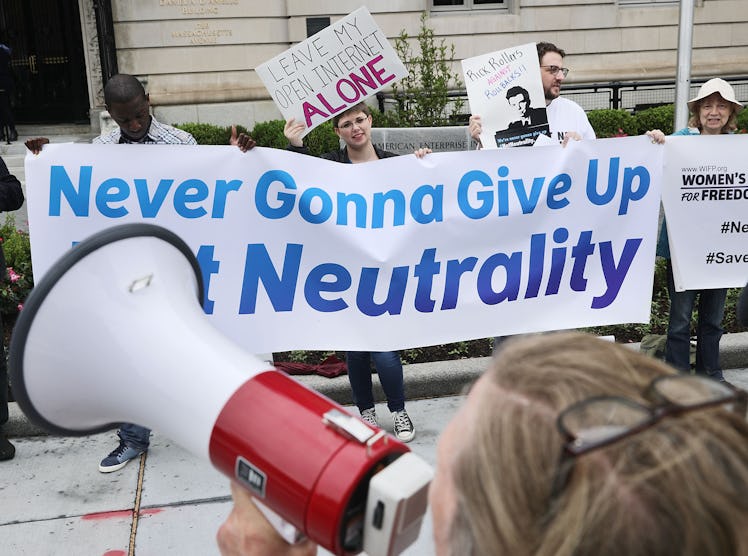
Your Internet Use Could Change Thanks To This Net Neutrality Rule Change
"#NetNeutrality is an issue that will affect every single person here. It is not a partisan issue. We will never go back to a free internet," tweeted the actor Kumail Nanjiani on Tuesday. Nanjiani's warning may sound alarmist, but it's hardly an overstatement given a net neutrality announcement made earlier by the Federal Communications Commission (FCC). The FCC's net neutrality proposal could change your internet use drastically.
Net neutrality rules, which were put in place by the Obama administration in 2015, prohibit internet providers from charging extra for fast service and from blocking content they don't like. The new proposal was made by FCC chairman Ajit Pai, who, in April, signaled he'd be making such a move, and opened up a public comment period.
The FCC's announcement to repeal net neutrality would put those protections in jeopardy, and it has sparked a flurry of concern, with good reason. Nanjiani's net neutrality sentiment on Twitter was echoed by others, including Netflix, which tweeted, "We oppose the FCC's proposal to roll back these core protections."
"Your internet service provider will be free to make online fast lanes and favor the content of its choice," said Gigi Sohn, a former senior adviser to former FCC chairman Tom Wheeler, who was quoted in the New York Times. "That it will take away your control of your internet experience and give it to Comcast, AT&T, and Verizon."
What is net neutrality?
Net neutrality, in short, provides for equitable access to the internet. The vast majority of Americans get their internet access from one of a few major players — Verizon, AT&T, Comcast, etc. Under Obama era rules, providers are only to provide the consumers with data and are prohibited from manipulating or analyzing your data. (What sites you visit, what items you bought, etc.) The rules also mean carriers can't prevent you from seeing content that they disagree with; for example, blocking websites that promote a political opinion or agenda that is damaging to them. Carriers are also not allowed to discriminate on internet speed based on how much you're paying them.
So undoing this has a lot of dangerous implications.
Content providers get to decide what you have access to.
The American Civil Liberties Union (ACLU) describes the FCC's attempt to undo net neutrality rules in simple terms: "The quest for profits and corporate disfavor of controversial viewpoints could change both what you can see on the internet and the quality of your connection." Basically, the content we'll be getting access to the most goes to the highest bidder.
Content provides could reserve fast internet connections for those with the biggest wallets.
With net neutrality gone, providers could force you to pay top dollar for faster connections, or charge you to access certain websites like streaming platforms.
Think about how much people have to use the internet for their work and livelihoods. Whoever has the slower internet speed — because they can't afford the pricy fast service — is put at a disadvantage. Time is money. If your connection is lousy, you're the last to know, you're getting less done, and you're probably getting left behind.
Consumer privacy protections could be in jeopardy.
"The incentive to monitor what you do online in order to play favorites means even more consumer privacy invasions piled on top of the NSA's prying eyes," according to the ACLU.
Let's say you're shopping online. If the carrier gets a financial kickback from that brand you're shopping at, they could manipulate the data to speed up your connection, and vice versa if you're visiting a company's website they don't like. That's essentially how the ACLU explains it.
Per the Times, the proposal, to be decided on Dec. 14, is expected to pass on a 3-2 vote, with three Republicans on the panel. Legal and consumer advocacy groups (as well as outspoken congresspeople and celebrities) are also anticipated to put up a fight. Whether it'll be enough to sway the vote remains to be seen.